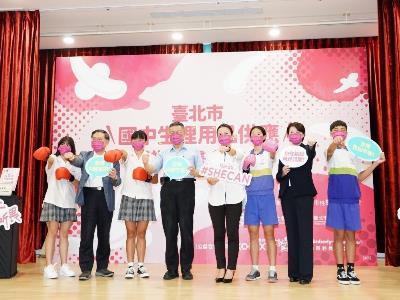Taipei City Piloted Free Female Physiologic Supplies at 5 Junior Highs
![]() Taipei City Government promotes gender equality and is in line with the international menstrual initiative. The new semester will start in September and will cooperate with Kingbury Clark’s Kotex, launching a piloted program for the supply of female physiological supplies for junior high schools across 5 junior high schools: Xinyi, Shilin, Chongqing, Muzha, and Guting.
Taipei City Government promotes gender equality and is in line with the international menstrual initiative. The new semester will start in September and will cooperate with Kingbury Clark’s Kotex, launching a piloted program for the supply of female physiological supplies for junior high schools across 5 junior high schools: Xinyi, Shilin, Chongqing, Muzha, and Guting.
This program will benefit 1,522 people in total. Mayor Ko Wen-je stated at the press conference that the menstrual equality movement comprises five important aspects: menstrual poverty, menstrual inequality, menstrual stigma, menstrual education, and menstrual rights. These are also things that the Little Red Hood strives to promote. He hopes to start from Taipei City and deepen the discussion of menstrual issues and collect relevant feedback through the implementation of the piloted program for the supply of physiological supplies on campus.
The heads of various diplomatic mission to Taiwan, including Ambassador of Saint Christopher and Nevis Jasmine Elise Huggins, Acting Representative of New Zealand Commerce and Industry Office Taipei (NZCIO) Stephanie Lee, and Lauran Salt, the Deputy Director of the Australian Office in Taipei, also attended the press conference to witness the new milestone for Taipei City Government.
Deputy mayor Huang Shan-shan, who has vigorously promoted the project, stated that the subsidy program for menstrual products is in the hopes that women will be aware of Taipei City Government’s efforts on creating a gender-friendly environment. Taipei City government will also actively seek Taipei City Council’s support for a comprehensive subsidy of menstrual products at middle schools in next year’s budget, hoping to implement menstrual equality and the promotion of gender equality on campus and becoming the first city to provide free menstrual products in Asia. She believes that menstrual education is also a part of sex education and life education, letting students understand that menstruation is as natural as air and water. With the professional assistance of teachers, it can alleviate the negative emotions caused by menstruation among young females.
Deputy Mayor Tsai Ping-kun also mentioned that while male students were less exposed to menstrual-related issues in the past, the time for menstrual supply subsidies is now ripe, hoping boys can learn to respect gender differences through this education.
This pilot project is independently sponsored by the Kotex Reliable brand under Kimberley Clark. President of Kimberly-Clark Taiwan, Min Huilin stated that the Kotex brand has long promoted menstrual health education, disseminated the concept of menstrual equality, and eliminated menstrual discrimination and prejudice. In 2020, on the occasion of the 100th anniversary of the brand's establishment, the "she can" initiative was launched globally to work with international non-profit organizations to eliminate menstrual stigma and menstrual poverty. Roughly 1.18 million adolescent girls have been reached in the Asia-Pacific region so far. Min remarked that the company is working with the Little Red Hood on the project to establish a "Let it come, be fearless" spirit and encourage adolescent children to face their physical growth and talk about menstruation in a healthy way.
Vivi Lin, the founder of the Little Red Hood for long-term menstruation initiatives, emphasized the importance of menstrual education. She lauded Taipei City Government for initiating this program and hopes to continue public-private collaboration in promoting menstrual equality. This pilot project is the first in the country. In addition to providing free physiological supplies, the project also integrates with menstrual education to deepen the connotation of gender equality on campus.
To promote this piloted project, the Kotex reliable brand has conducted the "she can” adolescent physiology education teacher training camp" during summer vacation. Furthermore, female middle school students are able to access to sanitary napkins at the female restrooms of the respective schools as soon as school begins next month. The "she can” menstrual box" will also carry out menstrual education and collect relevant feedback simultaneously.


![Taiwan.gov.tw [ open a new window]](/images/egov.png)
